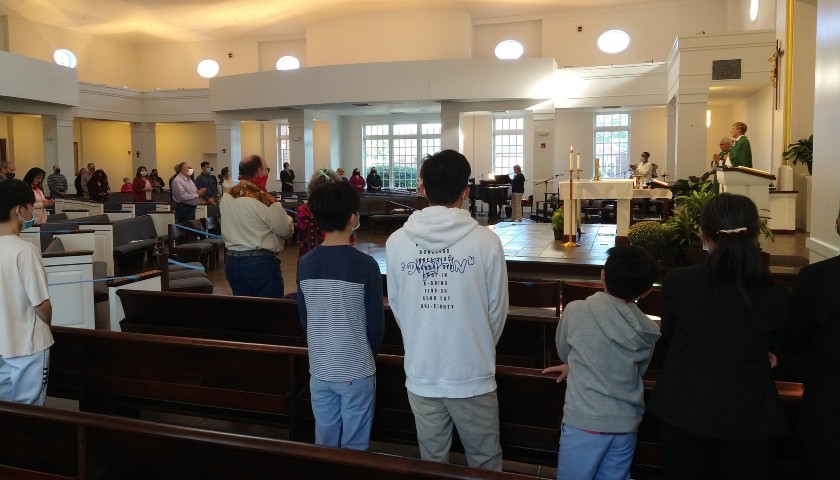by Catherine Mortensen
When hospitals in Maryland and Virginia recently denied patients access to their priests, the Trump administration stepped in to protect the patients’ religious freedom from Covid lockdown overreach.
According to the U.S. Department of Health and Human Services (HHS), it took government intervention to resolve the cases, one involving MedStar’s Southern Maryland Hospital Center (MSMHC) and the second one involving Mary Washington Healthcare (MWHC) in Virginia.
In July, a woman in Maryland had just given birth when she tested positive for Covid-19. The hospital immediately separated her from her baby. Shaken by the involuntary separation, the mother requested that a Catholic priest be allowed to visit her newborn son to baptize him. She said the hospital denied her request due to a Covid-19 visitor exclusion policy.
A month later, the family of a Covid-19 patient in a Virginia hospital had to seek help from the Catholic Diocese of Arlington before the staff would allow a priest to provide the Catholic religious sacraments of Holy Communion and Anointing of the Sick. They only did so after the federal Office for Civil Rights (OCR) stepped in to advocate for the patient and his family.
Shortly after that, the same Virginia hospital, MWHC, refused to allow a priest to provide religious sacraments to a surgery patient in an intensive care unit (ICU). The patient was neither Covid-positive nor suspected of being Covid-positive. Because hospital staff had designated the entire ICU as a Covid unit, they restricted visitors, except in end-of-life situations. Although the patient had just undergone a serious procedure, the staff determined the patient was not in an end-of-life situation and was denied access to clergy. The Diocese of Arlington again filed a complaint with OCR so that the ICU patient could receive religious support.
Congressman Doug Lamborn (CO-05), a long-time advocate for religious freedom, praised the Trump administration for stepping in to help these individuals practice their faith.
“The coronavirus pandemic should not serve as an excuse to restrict the access of religious clergy for patients in hospital settings,” Lamborn said. “While we must maintain safe practices for our doctors, nurses, and patients, religious support services provide critical assistance to our must vulnerable. I am grateful that the Office of Civil Rights and the Department of Health have provided a resolution allowing individuals to have access to clergy for compassionate care situations.”
In consultation with HHS staff, MedStar Health System updated its visitation policy for all ten hospitals under its purview, so that patients in COVID-19 positive units or sections, as well as non-COVID units, will be able to freely exercise their religion by receiving religious services from the religious leaders of their choice at any reasonable time, as long as the visit does not disrupt care.
Visiting clergy must follow hospital safety policies, including screening for COVID-19 infection, must follow proper infection prevention practices (such as hand washing/sanitizing, and physical distancing), and must wear a face mask.
The Mary Washington Healthcare system in Virginia also worked with HHS to come up with new policies that balance patient needs for compassionate spiritual support and the hospital’s practical need to protect staff, patients, and visitors from infection.
Under the new policy, patients in COVID units will have access to clergy in compassionate care situations, including end-of-life situations. MWHC will allow visits by clergy in COVID units, provided that the clergy member first completes scheduled infection control training offered by the hospital.
Patients in non-COVID units may exercise their religion by receiving clergy visitation at any reasonable time, as long as those services can be provided without disruption to care.
The Colorado-based group Focus on the Family, a strong defender of religious liberty, praised the HHS settlements.
“[They] are stellar examples of how the government ought to go about securing the freedoms that all Americans are guaranteed,” said Bruce Hausknecht, judicial analyst for Focus on the Family. “We applaud the ability to reach compromises that recognize both the need to protect patients and healthcare personnel during a pandemic, while protecting the right of all citizens to practice their faith when it is most important to them – when their health is threatened. We are encouraged by the cooperation exhibited by all the parties involved, as this resolution was reached without resorting to the courts. We hope this proves to be example to the country concerning what Americans can do together when we come together to solve problems.”
Compassionate care requires treating the body without sacrificing the soul, and these resolutions show how hospitals can do that safely even during a pandemic.
– – –
Catherine Mortensen is Vice President of Communications at Americans for Limited Government.
Photo “Church COVID” by Gerry Dincher CC BY-SA 2.0.




